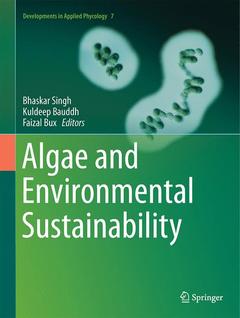Description
Algae and Environmental Sustainability, Softcover reprint of the original 1st ed. 2015
Developments in Applied Phycology Series, Vol. 7
Coordinators: Singh Bhaskar, Bauddh Kuldeep, Bux Faizal
Language: English
Subjects for Algae and Environmental Sustainability:
Keywords
Algae; Energy; Environment; Sustainable Approach; Wastewater
Publication date: 01-2016
Support: Print on demand
Publication date: 03-2018
Support: Print on demand
Description
/li>Contents
/li>Biography
/li>Comment
/li>
This book presents the dynamic role of algae in a sustainable environment. Two major aspects, namely bioenergy and bioremediation, have been elaborated in various chapter contributed by scientists and teachers from different geographical areas throughout the world. Algal biofuels is an emerging area of equal interest to researchers, industries, and policy makers working or focusing on alternative (i.e. renewable) fuels. Algae have been an area of interest due to their wide range of applications. Over the last 5 decades, eukaryotic algae have been used in the aquaculture industry as feed for invertebrates, providing a rich source of antioxidants, dietary fiber, minerals and protein. More recently, there has been a focus on the use of algal biomass in the development of alternative fuels. The extraction of oil from algae has been widely explored as a much more viable feedstock than plant-based oils in large-scale fuel production. using algae as feedstock has the advantages that it doesn?t require arable land and that wastewater can be used as a source of nutrients in their culture. The multifunctional approach of algae includes pollution remediation, carbon sequestration, biofuels production, and delivery of value-added products. However, there are still some obstacles that need to be overcome to make their use as potential feedstock for biofuels techno-economically feasible. In order to maintain the sustainability aspect of
algal biofuels, various aspects have to be studied and critically analyzed to assess the long-term sustainability of algal derived biofuels.This book discusses the role of algae as a promising future feedstock for biofuels. They are known to sequester carbon in much larger amounts than plants and as such the book also describes their phycoremediation potential for conventional as well as emerging contaminants. It describes the role of anaerobic digestion in algal biorefineries; bioreactions and process parameters; biogas recovery and reuse. The role of algal biofilm based technology in wastewater treatment and transforming waste into bio-products is discussed, and remediation of sewage water through algae is assessed. The book also describes the production of biohydrogen, bio-oil, biodiesel; and the major bottlenecks in their usage. The emerging characterization techniques of these biofuels (bio-oil and biodiesel) are described, as are the decolorizing potential of algae and the genetic engineering techniques that could enhance the production of lipids in algae. Other aspects of the book include the role of remote sensing technology in the monitoring of algae and a life cycle assessment of algal biofuels.
1. ALGAE: Promising Future Feed stock for Biofuels.- 2. Phycoremediation: Future Perspective of Green Technology.- 3. Applications of algal biofilms for wastewater treatment and bioproducts production.- 4. Biofuel production along with remediation of sewage water through Algae.- 5. The role of anaerobic digestion in algal biorefineries: clean energy production, organic waste treatment and nutrient loop closure.- 6. Algae based biohydrogen: Current status of bioprocess routes, economical assessment and major bottlenecks.- 7. Bio-oil and biodiesel as biofuels derived from microalgal oil and their characterization by using instrumental techniques.- 8. Remediation of dyes from aquatic ecosystems by biosorption method using algae.- 9. Bioremediation and decolourization of biomethanated distillery spent wash through Algae.- 10. Genetic engineering tools for enhancing lipid production in microalgae.- 11. Phycoremediation of Emerging Contaminants.- 12. Carbon dioxide sequestration bymicroalgae: Biorefinary approach for clean energy and environment.- 13. Remote Sensing strategy for the study of algal monitoring.- 14. Life Cycle Assessment of Algal Biofuels.
Dr. Bhaskar Singh received his Ph.D. in Applied Chemistry from Indian Institute of Technology (BHU), Varanasi, UP, India in 2010. Bhaskar Singh also holds an M.Phil. from Pondicherry (Central) University, India with a gold medal (2006). He is currently serving as an Assistant Professor at Centre for Environmental Sciences, Central University of Jharkhand, Ranchi, India. Dr. Singh is currently engaged in teaching in the thrust area of Environmental Sciences like Environmental Earth Science, Natural Resources, Environmental Chemistry, Environmental Pollution Monitoring & Control technologies, etc. He is reviewer of several international journals viz. Fuel, Renewable Energy, Renewable & Sustainable Energy Reviews (Elsevier Publications). Dr. Singh is serving as Treasurer of Ranchi Chapter of the Society “Professor HS Srivastava Foundation for Science and Society. His current interests lie in the application of algal biomass for biodiesel synthesis, development of heterogeneous and green catalysts, and corrosion aspects of biodiesel fuel. He has published more than 30 research and review papers in peer-reviewed and high impacted international journals and 4 book chapters by International Publishers.
Dr. Kuldeep Bauddh received his Ph.D. in Environmental Science from the Babasaheb Bhimrao Ambedkar University, Lukcnow, UP, India in 2014. He is currently an Assistant Professor of Environmental Sc
ience at the Centre for Environmental Sciences, Central University of Jharkhand, Ranchi, India. Dr. Bauddh is currently engaged in teaching the thrust area of environmental sciences like Environmental Pollution and Management, Environmental Chemistry, Environmental Toxicology, Soil Science, Hazardous Waste Management etc. He is also working as Associate Editor of the journal “Climate Change and Environmental Sustainability”and also Co-editor of the Magazine Kahaar. Dr. Bauddh is serving as Secretary of Ranchi Chapter of the Society “Pr



